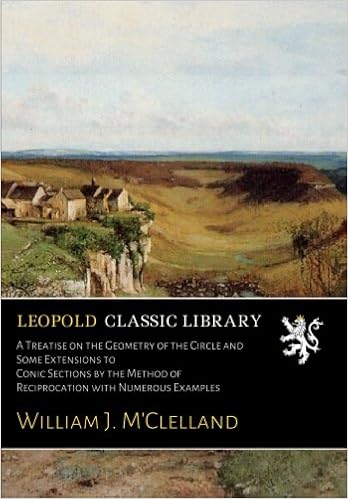
By Atsushi Kasue (auth.), K. Kenmotsu (eds.)
Read Online or Download Differential Geometry of Submanifolds: Proceedings of the Conference held at Kyoto, January 23–25, 1984 PDF
Best geometry books
Leopold is thrilled to post this vintage booklet as a part of our vast vintage Library assortment. some of the books in our assortment were out of print for many years, and accordingly haven't been available to most of the people. the purpose of our publishing application is to facilitate fast entry to this monstrous reservoir of literature, and our view is this is an important literary paintings, which merits to be introduced again into print after many a long time.
A tour of subriemannian geometries, their geodesics and applications
Subriemannian geometries, sometimes called Carnot-Caratheodory geometries, will be considered as limits of Riemannian geometries. in addition they come up in actual phenomenon concerning ""geometric phases"" or holonomy. Very approximately conversing, a subriemannian geometry includes a manifold endowed with a distribution (meaning a $k$-plane box, or subbundle of the tangent bundle), referred to as horizontal including an internal product on that distribution.
- Affine and Projective Geometry
- The Gelfand mathematical seminars, 1996-1999
- A Course on Elation Quadrangles
- Mathematische Analyse des Raumproblems: Vorlesungen, gehalten in Barcelona und Madrid
Additional info for Differential Geometry of Submanifolds: Proceedings of the Conference held at Kyoto, January 23–25, 1984
Sample text
Of T is equivalent and (3) m(1)+l ¢2 ) to In case of @ • v (p,q) = (6,3) and ~l+l (4,4) 35 ~2+i 84 70 in this case ¢i stan- (P~q~3). v ¢i (resp. sine Y) 105). (o~e~w/2) minimal into ~I to and sine 0 = and Z2 immersion result the first from 7, Proposition 5, ¢I 6(2), is linearly Case (resp. Lemma rigid. By (3) of Lemma 13. standard of S0(9)/S(0(6)x0(3)) In other words a of sm(1)(1). and Theorem (resp. d. (1) (2) ¢2 = 128 inequivalent Proof of Theorem A. ii, Lemma 10(3), Lemma imal immersion second) cos@ 0 = (ZI+I/~I+~2+2) I/2 (SO(p+q)/SO(p)xSO(q),(Xl/pq)g0) S0(6)xS0(3) (resp.
I. The standard minimal In this immersions section we explane the c o s t r u c t i o n of the standard minimal immersions and their properties Let M = G/K be an n - d i m e n s i o n a l compact type. (G,K) ple Lie group. We denote by K, respectively. induced by (cf. Wallach Let go ~ and operator of (M,g 0) M. , the set of all m u t u a l l y distinct For each integer basis of k Vk £ symmetric space of is a compact the Lie algebra of B of g. Let A a c t i n g on the space We denote by eigenvalues with the eigenvalue k~l, let G G semisimand be the G-invariant R i e m a n n i a n metric on all r e a l - v a l u e d C ~ - f u n c t i o n s on the eigenspace of irreducible is a symmetric pair and (-l)-times the Killing form Laplace-Beltrami [16]).
Parry and M. ~llicott; An analogue of the prime number theo- rem for closed orbits of Axiom A flows, Ann. of Math. I18(1983), 573-591. L. ables, [25] Royden; The A h l f o r s - S c h w a r z Comment. Math. Helv. R. T. Yau; of manifolds lemma in several 55(1980), Compact with non-positive complex vari- 547-558. group actions curvature, and the topology Topology 18(1979), 361- 380. [26] T. Sunada; Holomorphic mappings symmetric bounded domain, [27] T. Sunada; 51(1979), Rigidity 297-307. into a compact quotient Nagoya Math.



